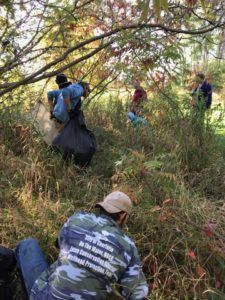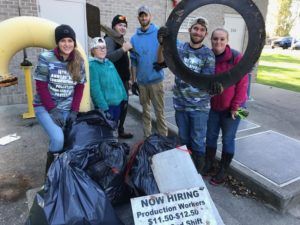Another successful event for On the Water!
This past Saturday On the Water which is funded by Consumers Energy teamed up with the City of Charlotte, and Eaton Conservation District for the 16th Annual Charlotte River Conservation Day. Over 35 volunteers came out to clean up their local river and to help maintain the rain garden. Between 150 and 200lbs of trash where removed from the river including some interesting items like a flag, leather glove, and a mini-fridge door!
Conservation Day. Over 35 volunteers came out to clean up their local river and to help maintain the rain garden. Between 150 and 200lbs of trash where removed from the river including some interesting items like a flag, leather glove, and a mini-fridge door!
Everyone had great positive mental attitudes and was happy to give back to their local watershed for a few short hours. This event wouldn’t have been such a success if it wasn’t for all of the volunteers who came out and contributed to making their home town river better for the next generation.
On the Water has one last project before the snow begins to fall. We have teamed up with U of M Flint’s Wildlife Club to help out the Flint River! On Saturday, October 12th at 9 am volunteers will meet in the parking lot behind the University of Michigan-Flint Recreation Center it is called lot “A” we will then proceed to the cleanup site.
 The Flint River is a vibrant ecosystem that supports a wide array of flora, fauna, wildlife and recreational opportunities the main fish that the Flint River supports are Bullhead, Carp, Catfish, Crappie, Largemouth Bass, Northern Pike, Smallmouth Bass, Sucker, Sunfish, Walleye, and Yellow Perch.
The Flint River is a vibrant ecosystem that supports a wide array of flora, fauna, wildlife and recreational opportunities the main fish that the Flint River supports are Bullhead, Carp, Catfish, Crappie, Largemouth Bass, Northern Pike, Smallmouth Bass, Sucker, Sunfish, Walleye, and Yellow Perch.
According to flintriver.org, “The Flint River Watershed is more than 1,358 square miles and encompasses portions of 7 counties, 20 cities & villages, and 58 townships. The Watershed drains this large land area through the Flint River and all the tributaries of the Flint. It includes most of Genesee and Lapeer Counties, and parts of Shiawassee, Oakland, Tuscola, Sanilac, and Saginaw Counties. The Native American name for this river was Pewonigowink, meaning “river of fire stone”. The Flint River is 78.3-miles-long and is formed in Lapeer County near Columbiaville where the river’s South Branch and North Branch come together. ”
One of the main problems that the Flint River experiences are the pollution and stormwater that runs into the river and watershed from point and non-point sources. This is a problem nationwide according to government officials and river advocates. Polluted sto-
 rmwater that drains off the landscape harms water quality and aquatic life. It also alters the natural flow of the river, which can cause a myriad of problems, such as flooding and streambank erosion. This issue is not unique to the Flint River — stormwater runoff is the biggest threat to rivers nationwide, according to the U.S. Environmental Protection Agency.
rmwater that drains off the landscape harms water quality and aquatic life. It also alters the natural flow of the river, which can cause a myriad of problems, such as flooding and streambank erosion. This issue is not unique to the Flint River — stormwater runoff is the biggest threat to rivers nationwide, according to the U.S. Environmental Protection Agency.
We can always do our part as local citizens and help clean up the river and its shore banks this Saturday! What we do upstream, not only benefits us but also impacts everyone who is downstream as well. Let’s make a positive impact this weekend for future generations.
All are welcome to join us for a great day of volunteering to help improve the Flint River’s habitat before the snow begins to fall. Please contact Emma Nehan at enehan@mucc.org if you have any questions.
The post Another successful event for On the Water! appeared first on Michigan United Conservation Clubs.
Recent Posts



